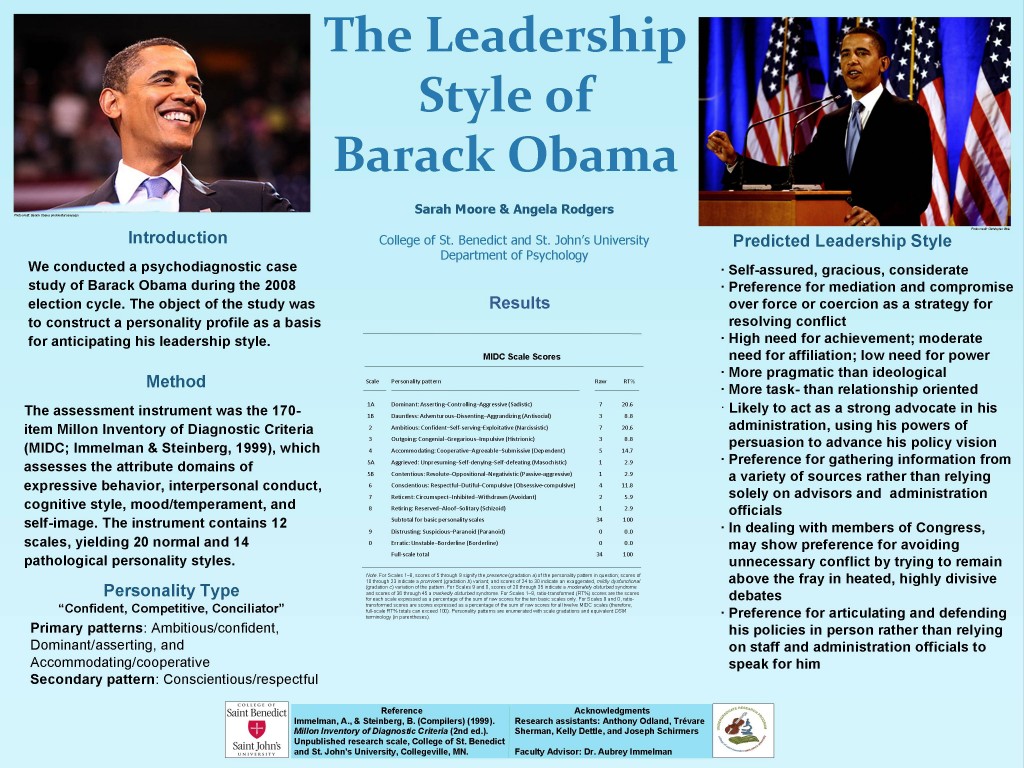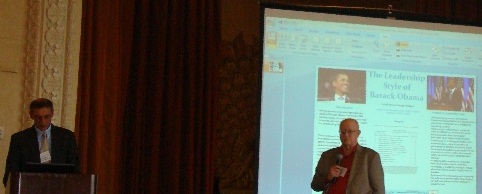Featured Posts

- Index of Psychological Studies of Presidents and Other Leaders Conducted at the Unit for the Study of Personality in Politics
- The Personality Profile of U.S. Supreme Court Associate Justice Brett Kavanaugh
- The Leadership Style of North Korean Leader Kim Jong-un
- North Korea Threat Assessment: The Psychological Profile of Kim Jong-un
- Russia Threat Assessment: Psychological Profile of Vladimir Putin
- The Personality Profile of 2016 Republican Presidential Candidate Donald Trump
- Donald Trump's Narcissism Is Not the Main Issue
- New Website on the Psychology of Politics
- Unit for the Study of Personality in Politics --- 'Media Tipsheet'
categories

- Afghanistan (228)
- Al Gore (2)
- Amy Klobuchar (4)
- Ayman al-Zawahiri (7)
- Barack Obama (60)
- Ben Carson (2)
- Bernie Sanders (7)
- Beto O'Rourke (3)
- Bill Clinton (4)
- Bob Dole (2)
- Campaign log (109)
- Chris Christie (2)
- Chuck Hagel (7)
- Criminal profiles (8)
- Dick Cheney (11)
- Domestic resistance movements (21)
- Donald Trump (31)
- Economy (33)
- Elizabeth Warren (4)
- Environment (24)
- George H. W. Bush (1)
- George W. Bush (21)
- Hillary Clinton (9)
- Immigration (39)
- Iran (43)
- Iraq (258)
- Jeb Bush (3)
- Joe Biden (13)
- John Edwards (2)
- John Kasich (2)
- John Kerry (1)
- John McCain (7)
- Kamala Harris (5)
- Kim Jong-il (3)
- Kim Jong-un (11)
- Law enforcement (25)
- Libya (18)
- Mahmoud Ahmadinejad (6)
- Marco Rubio (2)
- Michael Bloomberg (1)
- Michele Bachmann (173)
- Mike Pence (3)
- Military casualties (234)
- Missing person cases (37)
- Mitt Romney (13)
- Muqtada al-Sadr (10)
- Muslim Brotherhood (6)
- National security (16)
- Nelson Mandela (4)
- News (5)
- North Korea (36)
- Osama bin Laden (19)
- Pakistan (49)
- Personal log (25)
- Pete Buttigieg (4)
- Presidential candidates (19)
- Religious persecution (11)
- Rick Perry (3)
- Rick Santorum (2)
- Robert Mugabe (2)
- Rudy Giuliani (4)
- Russia (7)
- Sarah Palin (7)
- Scott Walker (2)
- Somalia (20)
- Supreme Court (4)
- Syria (5)
- Ted Cruz (4)
- Terrorism (65)
- Tim Pawlenty (8)
- Tom Horner (14)
- Tributes (40)
- Uncategorized (50)
- Vladimir Putin (4)
- Xi Jinping (2)
- Yemen (24)
Links

archives

- November 2021
- January 2021
- November 2020
- October 2020
- September 2020
- August 2020
- July 2020
- April 2020
- March 2020
- February 2020
- January 2020
- December 2019
- October 2019
- July 2019
- May 2019
- April 2019
- March 2019
- February 2019
- January 2019
- December 2018
- September 2018
- August 2018
- July 2018
- June 2018
- April 2018
- March 2018
- February 2018
- January 2018
- August 2017
- July 2017
- June 2017
- May 2017
- April 2017
- February 2017
- January 2017
- December 2016
- November 2016
- October 2016
- September 2016
- August 2016
- July 2016
- June 2016
- May 2016
- April 2016
- March 2016
- February 2016
- January 2016
- December 2015
- November 2015
- October 2015
- September 2015
- August 2015
- July 2015
- June 2015
- May 2015
- April 2015
- March 2015
- February 2015
- January 2015
- December 2014
- November 2014
- October 2014
- September 2014
- August 2014
- July 2014
- June 2014
- May 2014
- April 2014
- March 2014
- February 2014
- January 2014
- December 2013
- November 2013
- October 2013
- September 2013
- August 2013
- July 2013
- June 2013
- May 2013
- April 2013
- March 2013
- February 2013
- January 2013
- December 2012
- November 2012
- October 2012
- September 2012
- August 2012
- July 2012
- June 2012
- May 2012
- April 2012
- March 2012
- February 2012
- January 2012
- December 2011
- November 2011
- October 2011
- September 2011
- August 2011
- July 2011
- June 2011
- May 2011
- April 2011
- March 2011
- February 2011
- January 2011
- December 2010
- November 2010
- October 2010
- September 2010
- August 2010
- July 2010
- June 2010
- May 2010
- April 2010
- March 2010
- February 2010
- January 2010
- December 2009
- November 2009
- October 2009
- September 2009
- August 2009
- July 2009
- June 2009
- May 2009
- April 2009
- March 2009
- February 2009
- January 2009
- December 2008
- November 2008
- October 2008
- September 2008
- August 2008
- July 2008
meta

A psychological profile of U.S. President Barack Obama, developed at the Unit for the Study of Personality in Politics during Obama’s 2008 and 2012 presidential campaigns, reveals that the president is a highly confident, moderately accommodating and deliberative, somewhat reserved personality type best described as a confident conciliator.

Click on image for larger display
As shown in the pie chart above, Obama is primarily an Ambitious-confident personality, complemented by secondary Accommodating/cooperative, Conscientious/respectful, and Retiring/reserved features.
Obama’s personality profile provides a stable framework for anticipating his likely leadership style as president if reelected. Following is a political-psychological prognostication of a prospective second-term Obama presidency, as reported in the St. Cloud Times.
———————————————————
Obama is a ‘Confident Conciliator’

Click on image for larger view (not part of St. Cloud Times report)
By Aubrey Immelman
St. Cloud Times
September 8, 2012
At the Democratic National Convention in Charlotte N.C., former President Bill Clinton on Wednesday put Barack Obama’s name in nomination for reelection as president with an impassioned plea that Americans renew Obama’s contract for four more years.
For those voters who have yet to decide whether to let Obama keep the keys to the White House or send him packing, here’s a primer in political prognostication: past is prologue; and personality drives behavior.
Past is prologue
The best predictor of future behavior is past behavior. No speech, no campaign promise will fundamentally alter the general tenor of the Obama presidency in a second term.
If you dislike Obama’s first-term agenda or leadership style as president, there’s little reason to cast a vote for Obama in hope of change.
For the nonpartisan or independent voter, the great challenge is to anticipate how the candidate will govern. That task is simplified with an incumbent because the candidate’s track record telegraphs his likely path.
However, the future is always uncertain. Little did we know when we sized up George W. Bush’s fitness for office in 2000 that history would throw us a curveball a year later in the form of Sept. 11.
This is where political psychology earns its keep.
Personality drives behavior
Personality refers to the stable patterns of a person’s motives, thoughts and actions over time and across a broad range of situations. Accurate personality assessment allows us to anticipate a leader’s response to a broad range of contingencies – including those not currently on the political radar.
Equally important, political psychologists have developed predictive models that link a leader’s personality traits to his or her likely performance as chief executive.
Obama is a “confident conciliator†– a leader with a healthy dose of adaptive narcissism and a stronger accommodating tendency than most presidents.
Leadership
The following generalized expectancies regarding Obama’s leadership style as president can be inferred from his personality profile:
- Motivation for leading. Obama has extraordinary confidence in his ideas and potential for success, which suggests that at his core he is ideologically driven by a desire to transform society. However, because he is not highly dominant, driven more by a need for achievement than by power for its own sake, he is relatively pragmatic in his efforts to consummate his policy objectives.
- Leadership orientation. As a confident, ambitious person, Obama tends to be a goal-oriented leader first, motivated primarily by advancing his policy objectives, with only secondary consideration to maintaining good relations among members of his team.
- Investment in job performance. Obama, despite a seemingly relaxed, casual personal style, is an active, energetic leader highly invested in achieving his policy objectives.
- Management style. With his high ambition, Obama is inclined to act as a strong advocate, promoting his policy vision and using his powers of persuasion to advance his agenda. However, because of his accommodating tendency, Obama’s activism is tempered by an inclination to act as a consensus builder or arbitrator within his administration and across party lines.
- Dealing with the legislative branch of government. Obama has the flexibility to behave either cooperatively or competitively in his dealings with members of Congress, depending on his perception of which strategy will prove most effective in achieving the desired result. However, his conciliatory tendency renders him somewhat conflict averse, which fosters a proclivity to remain somewhat aloof and above the fray in heated, highly divisive debates.
- Media relations. In dealing with the media, Obama is predisposed to maintain cordial press relations, especially if he feels he can influence the press to do his bidding. However, should the press become antagonistic, he is likely to become correspondingly uncooperative, avoidant, or aloof.
- Public relations. In relating to the public, confident leaders such as Obama typically are involved and active, articulating and defending their policies in person rather than relying on proxies. However, if matters become contentious, Obama’s conflict aversion may induce him to delegate that role to surrogates.
On balance, nothing specific to Obama’s personality profile or leadership style suggests that he deserves to be fired. By the same token, anyone with a preexisting objection to Obama can probably find something in his profile to confirm their prior belief.
This is the opinion of Aubrey Immelman, a political psychologist who specializes in the psychological assessment of presidential candidates. He also was a candidate in the Republican primary for the U.S. House 6th District race. A similar profile of Republican nominee Mitt Romney was published in the Aug. 30 Times.
————————————
Full research report
The Political Personality of U.S. President Barack Obama
Paper presented at the 33rd Annual Scientific Meeting of the International Society of Political Psychology, San Francisco, CA, July 7–10, 2010. Retrieved from Digital Commons website: http://digitalcommons.csbsju.edu/psychology_pubs/25/

Presenter Aubrey Immelman and discussant Peter Suedfeld (Photo: Irina Rogozar-Kolpakova)
————————————————
Related reports on this site

Sarah Moore and Angela Rodgers present their research on “The Personality Profile of President Barack Obama: Leadership Implications” at the 6th annual Minnesota Private Colleges Scholars at the Capitol event in the State Capitol rotunda, St. Paul, Minn., Feb. 19, 2009. The research was conducted under the auspices of the Unit for the Study of Personality in Politics, directed by College of St. Benedict / St. John’s University associate professor of psychology Aubrey Immelman, Ph.D.
A Key to Success for Obama? (March 17, 2009)
Barack Obama’s Leadership Style (Feb. 21, 2009)
Obama’s Decision-Making Style (Nov. 25, 2008)
Barack Obama’s Personality Profile (Nov. 2, 2008)
Leave a Reply
You must be logged in to post a comment.


September 8th, 2012 at 11:46 am
[…] Barack Obama’s Presidential Leadership Style (Sept. 8, 2012) […]
September 8th, 2012 at 11:55 am
[…] Barack Obama’s Presidential Leadership Style […]
September 8th, 2012 at 12:10 pm
[…] Barack Obama’s Presidential Leadership Style (Sept. 8, 2012) […]
September 8th, 2012 at 12:29 pm
[…] Barack Obama’s Presidential Leadership Style […]
September 30th, 2012 at 9:07 pm
[…] Barack Obama’s Presidential Leadership Style (Sept. 8, 2012) […]
October 29th, 2012 at 9:17 am
[…] Barack Obama’s Presidential Leadership Style (Sept. 8, 2012) […]
January 23rd, 2014 at 8:27 pm
According to the leadership profile, “because he is not highly dominant, driven more by a need for achievement than by power for its own sake, he is relatively pragmatic in his efforts to consummate his policy objectives.”
Michael Smerconish (â€@smerconish) on Twitter: Highly recommend David Remnick’s piece @NewYorker re POTUS confirming my view of Obama as pragmatist not ideologue: http://nyr.kr/1jerNI8
[http://www.newyorker.com/reporting/2014/01/27/140127fa_fact_remnick]
March 27th, 2014 at 4:40 am
[…] Barack Obama’s Presidential Leadership Style (Sept. 8, 2012) […]
August 4th, 2014 at 12:57 am
[…] Barack Obama’s Presidential Leadership Style (Sept. 8, 2012) […]
August 25th, 2014 at 9:58 pm
[…] Comme nous le verrons plus loin dans ce texte, le président Obama a une approche très imprégnée de ces principes, et nombre de ses choix s’inscrivent d’ailleurs beaucoup moins dans le soft power que ce que dénote une communication séduisante où sont mis en avant sa personnalité charismatique, sympathique, détendue et une “cool attitude” (que ses adversaires sont d’ailleurs tentés d’utiliser contre lui, imputant certaines contre-performances dans les domaines sociaux et économiques à son “côté paillettes” dilettante ou laxiste). Pourtant comme une etude psychologique du président effectuée en 2008 l’indique, cette attitude masque une personnalité de leader actif et énergique complètement investi dans la réalisation de ses objectifs stratégiques. […]
July 28th, 2015 at 12:47 pm
[…] Barack Obama’s leadership style […]
February 6th, 2021 at 8:59 pm
[…] Download Image More @ http://www.immelman.us […]